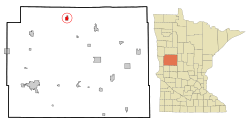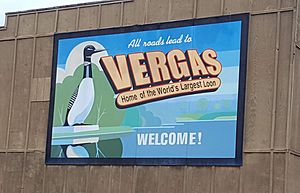Vergas, Minnesota facts for kids
Quick facts for kids
Vergas
|
|
|---|---|

Location of Vergas, Minnesota
|
|
| Country | United States |
| State | Minnesota |
| County | Otter Tail |
| Founded | 1903 |
| Area | |
| • Total | 1.61 sq mi (4.16 km2) |
| • Land | 1.57 sq mi (4.06 km2) |
| • Water | 0.04 sq mi (0.10 km2) |
| Elevation | 1,411 ft (430 m) |
| Population
(2020)
|
|
| • Total | 348 |
| • Estimate
(2021)
|
348 |
| • Density | 222.22/sq mi (85.81/km2) |
| Time zone | UTC-6 (CST) |
| • Summer (DST) | UTC-5 (CDT) |
| ZIP code |
56587
|
| Area code(s) | 218 |
| FIPS code | 27-66766 |
| GNIS feature ID | 2397125 |
Vergas is a small city located in northern Otter Tail County, Minnesota, in the United States. In 2020, about 348 people lived there.
Vergas is famous for being home to the World's Largest Loon. This is a huge sculpture, about 20 feet (6.1 meters) tall, of a loon. The loon is the official state bird of Minnesota.
Contents
History of Vergas
The community of Vergas was first planned out in 1903. It was originally going to be called Altona. However, its name was quickly changed to match the nearby train station.
The train station belonged to the Minneapolis, St. Paul and Sault Ste. Marie Railroad, often called the Soo Line Railroad. The station itself was named after some special sleeping cars. These cars traveled between Minneapolis, Minnesota and Winnipeg, Manitoba, in Canada.
Geography and Location
According to the United States Census Bureau, the city of Vergas covers a total area of about 1.50 square miles (3.88 square kilometers). Most of this area, about 1.46 square miles (3.78 square kilometers), is land. The rest, about 0.04 square miles (0.10 square kilometers), is water.
Vergas is found where several roads meet. These include County Highway 4, County Highway 17, and what used to be State Highway 228.
The city is also located at the western end of a body of water called Long Lake. Another lake, Loon Lake, is just southwest of Vergas.
Population and People
| Historical population | |||
|---|---|---|---|
| Census | Pop. | %± | |
| 1910 | 237 | — | |
| 1920 | 361 | 52.3% | |
| 1930 | 323 | −10.5% | |
| 1940 | 351 | 8.7% | |
| 1950 | 301 | −14.2% | |
| 1960 | 292 | −3.0% | |
| 1970 | 281 | −3.8% | |
| 1980 | 287 | 2.1% | |
| 1990 | 287 | 0.0% | |
| 2000 | 311 | 8.4% | |
| 2010 | 331 | 6.4% | |
| 2020 | 348 | 5.1% | |
| 2021 (est.) | 348 | 5.1% | |
| U.S. Decennial Census 2020 Census |
|||
Vergas Population in 2010
In 2010, the city of Vergas had 331 people living there. These people lived in 176 households, and 88 of these were families. The population density was about 226.7 people per square mile (87.5 people per square kilometer).
Most of the people living in Vergas were White (99.1%). A very small number were African American (0.3%), from other races (0.3%), or from two or more races (0.3%). About 0.3% of the population identified as Hispanic or Latino.
The average age of people in Vergas was 52.5 years old. About 13.3% of residents were under 18. Also, 27.5% of the people were 65 years old or older. The number of males and females was almost equal, with 49.5% male and 50.5% female.
The Famous Loon Sculpture
The large loon statue in Vergas stands tall and looks out over Long Lake. This impressive sculpture is 20 feet (6.1 meters) high. It was built in the 1960s.
The Vergas Fire Department paid for the sculpture. They dedicated it to a town postmaster who had passed away. It has become a well-known symbol of the city.
See also
 In Spanish: Vergas (Minnesota) para niños
In Spanish: Vergas (Minnesota) para niños
 | Aaron Henry |
 | T. R. M. Howard |
 | Jesse Jackson |


